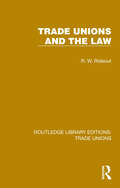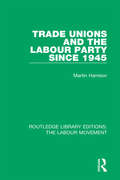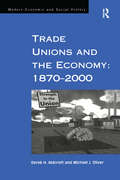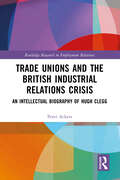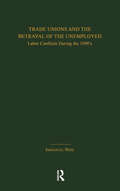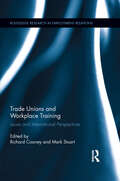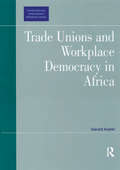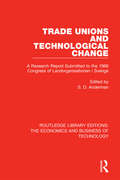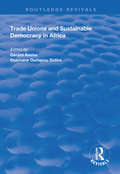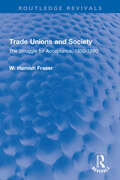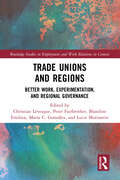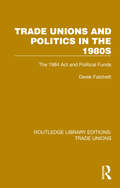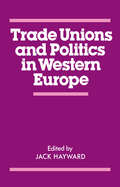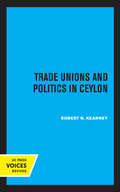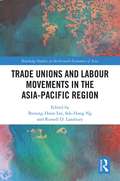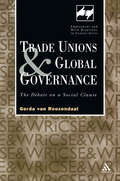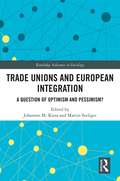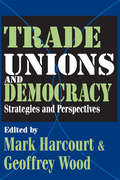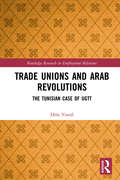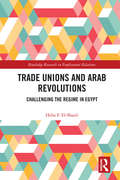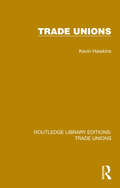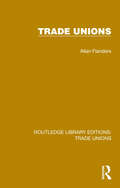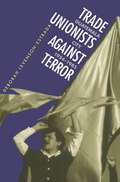- Table View
- List View
Trade Unions and the Law (Routledge Library Editions: Trade Unions #19)
by R. W. RideoutOriginally published in 1973, this book was designed as a concise and usable guide to those aspects of the law which particularly affect trade union members and officials. It deals with the internal and external affairs of trade unions and the law relating to collective bargaining. It also covers deals with dismissal from employment, redundancy and employers’ liability for industrial injuries. The information is presented in a readable form without technical footnotes but with a considerable amount of background information. Diagrams and charts are used where applicable to present or reinforce information.
Trade Unions and the Labour Party since 1945 (Routledge Library Editions: The Labour Movement #15)
by Martin HarrisonFirst published in 1960. This title is a study of one of the most controversial alliances in British political history. The ‘wage freeze’, Bevanism, the block vote, nuclear disarmament: these are only a few of the points at which the unions’ activities within the Labour Party had roused hot debate. Drawing extensively on previously unpublished material and on discussions with past members of the Labour Movement, the author creates a survey of what the partnership really amounted to.
Trade Unions and the Economy: 1870–2000 (Modern Economic and Social History)
by Derek H. Aldcroft Michael J. OliverWhat do unions do and why do they do it? Do they seek to maximise profit for their members, or to obtain better working conditions that benefit society as a whole? Derek H. Aldcroft and Michael J. Oliver here provide one of the first sustained studies of the effects of union activities in terms of economic performance and the impact on the business world. From the rise of the British mass trade union movement in the 1870s to the present day, the book examines the main trends in union development and structure, and the core strategies unions have used to achieve their objectives: the use of strikes, work rules and restrictive practices; workers’ attitudes to innovation; the wage bargaining process. Important assessments are made of the influence of these strategies on investment, innovation, economic growth, and the cost of structure and competitiveness of the UK economy.
Trade Unions and the British Industrial Relations Crisis: An Intellectual Biography of Hugh Clegg (Routledge Research in Employment Relations)
by Peter AckersHugh Clegg was a founding figure of post-war British Industrial Relations, the forerunner of Employment Relations and Human Resource Management, as taught in most Business Schools today. He defined ‘industrial democracy’ as collective bargaining with trade unions, laid the foundations for the pluralist approach to Industrial Relations, was a key figure in the post-war social sciences and a major public policy player. More widely, he was an important figure in the Cold War social democratic academic left, who broke with his earlier Communism to champion free trade unions in a liberal democratic society. He also produced the major Oxford University Press trade union history. This book aims to understand the politics and industrial relations of the post-war period in Britain (in which trade unions were central) through the life of a key public intellectual. It will help readers understand the political and social science roots of contemporary Employment Relations and Human Resource Management through a deep historical study of Clegg’s life and times, in the context of his post-war social democratic generation. It illustrates how the failures of post-war industrial relations led to Thatcherism. Current Employment Relations academics and public policy can learn much from this history, making it of value to researchers, students, and academics in the fields of Human Resource Management and business and management history.
Trade Unions and the Betrayal of the Unemployed: Labor Conflicts During the 1990's (Garland Studies in the History of American Labor)
by Immanuel NessThis book examines the problematic relationship between unions and the unemployed in New York City during the 1990's. Historically, trade unions in the U.S. have had an interest in the political mobilization of the jobless to expand unemployment insurance and lessen the threat of lower wages, reduced union density, and weaker bargaining positions for unions. Despite these advantages, trade unions have rarely organized the unemployed, because they represent a potential threat to the organizational control, leadership, and legitimacy of the trade unions themselves. Moreover, the interests of the unemployed conflict directly with those of the securely employed trade unionist.The study identifies union responses to unemployment at local and regional levels and the responses of independent activist organizations. The research suggests that hiring hall unions produce exclusive organizing strategies that have deeper accountability to their members, but with organizing objectives that serve only the narrow interests of core members. By contrast, workplace-based unions typically engender class-oriented unions with narrow accountability to members, but with organizing objectives that extend beyond their immediate members.
Trade Unions and Workplace Training: Issues and International Perspectives (Routledge Research in Employment Relations)
by Mark Stuart Richard CooneyTrade Unions and Workplace Training examines the changing role of trade unions in the provision of vocational education, workplace training and skill development. It reflects upon: the role that unions have played in the reform of vocational education and training systems; the nature of union involvement in consultative mechanisms at a national and industry level; the nature of union involvement in skill formation at the workplace; and the development of mechanisms for the articulation of employee voice in the design, delivery and assessment of vocational training. The book provides a collection of studies of Canada, Australia, United States, United Kingdom, France, Germany and Norway by leading researchers in the field. Distinctive, accessible and original, all the chapters are written in a style that illustrates the relevance of academic debates and research data to practice and the book includes a number of the chapters written by trade union practitioners.
Trade Unions and Workplace Democracy in Africa (Contemporary Employment Relations)
by Gérard KesterCan democracy only survive if it is participatory? Is participatory democracy a prerequisite for sustainable development? Are trade unions the most appropriate body through which such aims can be implemented? These critical questions are tackled in Gérard Kester's book, Trade Unions and Workplace Democracy in Africa, which applies an unparalleled depth of research to these issues as they impact African nations, including: Cape Verde, Burkina Faso, Mali, Guinea, Ghana, South Africa, Zambia, Tanzania and Zimbabwe. Rigorously structured, it sets the background of the research and the underlying theory, before presenting the learning experiences within different countries and the the broad implications of the research findings for policy making on democratic participation.
Trade Unions and Technological Change: A Research Report Submitted to the 1966 Congress of Landsorganistionen i Sverige (Routledge Library Editions: The Economics and Business of Technology #2)
by S. D. AndermanWhen this book was first published in 1967, it was one of the first pieces of research to systematically examine the manpower problems associated with rapidly changing technology. It discusses issues such as technological change and unemployment, changes in the structure of employment, the mobility of labour, occupational structure and adjustment, hours of work, and labour-management relations. Its findings suggest that structural unemployment and redundancy are only two of a host of difficulties accompanying technical progress. Although the book originated in Sweden its relevance is clear to other Western european countries and researchers and policy-makers in the USA.
Trade Unions and Sustainable Democracy in Africa (Routledge Revivals)
by Gerard Kester Ousmane Oumarou SidibeFirst published in 1997, this volume sets out to open a dialogue with the trade union movement and its social partners including civil society, political leaders and the scientific community. The authors, all of whom work closely with APADEP, have drawn on their personal experience and have been guided by a simple, yet flexible, theme: trends in the last few decades in their countries, with the emphasis on transition over the last five years. Part I consists of an overview of sub-Saharan Africa based on selected documentation. Part II is given over to an analysis of the specific situations obtaining in ten African countries in different geographical and language areas. Each case study provides its own democratisation scenario.
Trade Unions and Society: The Struggle for Acceptance, 1850-1880 (Routledge Revivals)
by Hamish FraserFirst published in 1974, Trade Unions and Society examines the process by which trade unions sought and achieved recognition in the three decades after 1850. It shows a parallel process: on the one hand, trade unionists struggling to attain the indispensable Victorian virtue, ‘respectability’, without sacrificing their essentially protective functions; on the other hand, employers recognizing the value of an ordered system of industrial relation in which trade unions could exert discipline and control over their workers. While this was going on, middle-class radicals (often themselves employers) continued their attack on aristocratic domination of political institutions and looked to a ‘labour aristocracy’ as allies. The book shows the manner in which, thanks to their own efforts and those of their indefatigable publicists, unionists became identified with the respectable elite of the working class. It deals with a crucial period in the trade union development but looks at it not merely from the point of view of the unions, but also that of the employers, politicians, the press, intellectuals, political economists, giving for the first time a rounded picture of trade unionism and industrial relations in the third quarter of the nineteenth century. This book will be of interest to students of economics and history.
Trade Unions and Regions: Better Work, Experimentation, and Regional Governance (Routledge Studies in Employment and Work Relations in Context)
by Christian LévesqueTrade Unions and Regions: Better Work, Experimentation, and Regional Governance is about the place of workers and their unions in the modern world. It addresses current challenges for unions working in regions and the experiments that may take place at this level of governance. The book addresses pressing questions concerned with the conditions for better work and a humane society. The focus is on the capacities of unions to address questions relating to regional governance, in both supranational and sub-national regions. It examines workers and their unions in a variety of contexts: multinationals, industries, workplaces, and communities. The authors address the experiments that can be initiated by unions, governments, or employers and the ways in which collective organisations engage to address these matters in regional contexts. The analysis takes as a starting point the fracturing and divisions evident in various regions, in Australia, Canada, Mexico, Spain, the United Kingdom, and USA. The contributors propose novel analyses with lessons for unions. It should be of interest to union activists and leaders, political parties, governments, and those who make decisions in and about regions. Researchers and students of labour markets, political mobilisation, and employment relations will take the analyses further.
Trade Unions and Politics in the 1980s: The 1984 Act and Political Funds (Routledge Library Editions: Trade Unions #6)
by Derek FatchettOriginally published in 1987, this book traces the historical and sociological dimensions of the Trade Union movement and analyses the nature of the trade unions’ involvement in the UK Labour Party during the 1970s and 80s. It discusses the review campaigns, and their implications, both for trade unions specifically and for politics in general. From the viewpoint of the trade unions, this book tells of an experience which was, for the Thatcher era, uniquely successful and innervating, opening up new approaches to campaigning.
Trade Unions and Politics in Western Europe
by J. E. HaywardThis book analyses the politics and political issues associated with Trade Unions and Trade Unionism in Western Europe.
Trade Unions and Politics in Ceylon (Center for South and Southeast Asia Studies)
by Robert N. KearneyThis title is part of UC Press's Voices Revived program, which commemorates University of California Press’s mission to seek out and cultivate the brightest minds and give them voice, reach, and impact. Drawing on a backlist dating to 1893, Voices Revived makes high-quality, peer-reviewed scholarship accessible once again using print-on-demand technology. This title was originally published in 1971.
Trade Unions and Labour Movements in the Asia-Pacific Region (Routledge Studies in the Growth Economies of Asia)
by Byoung-Hoon Lee Sek-Hong Ng Russell LansburyRecent developments in the world economy, including deindustrialisation and the digital revolution, have led to an increasingly individualistic relationship between workers and employers, which in turn has weakened labour movements and worker representation. However, this process is not universal, including in some countries of Asia, where trade unions are closely aligned with the interests of the dominant political party and the state. This book considers the many challenges facing trade unions and worker representation in a wide range of Asian countries. For each country, full background is given on how trade unions and other forms of worker representation have arisen. Key questions then considered include the challenges facing trade unions and worker representation in each country, the extent to which these are a result of global or local developments and the actions being taken by trade unions and worker representative bodies to cope with the challenges.
Trade Unions and Global Governance: The Debate on a Social Clause (Routledge Studies in Employment and Work Relations in Context)
by Gerda van RoozendaalAs the world economy is liberalized, and national economies become more intertwined, the national decision making of states is also increasingly interdependent, and it has become vital for non-governmental organizations to create an international agenda. This title is an important study of what makes such organizations successful on an international level. The focus is on trade unions, as a key international group of NGOs. It asks whether a global system can be designed to stimulate countries to observe a set of minimum or core standards. It explores three important questions: how have unions attempted to influence the debate on the inclusion of minumum labour standards in the WTO agreement?; what accounts for their success or lack of success?; and what conclusions, with respect to the effective behaviour of trade unions in the construction of international policy, can be drawn from these experiences? In exploring these questions the text looks at social clause debates within a number of international bodies: the ILO, OECD and the EU, and within two countries: the USA and India.
Trade Unions and European Integration: A Question of Optimism and Pessimism? (Routledge Advances in Sociology)
by Martin Seeliger Johannes M KiessTrade Unions and European Integration brings together pessimists and optimists on trade unionism under the contemporary pressures of European integration. The Great Recession has brought new attention to structural problems of the European integration process, specifically monetary integration; holding the potential of disabling any trans-national co-ordination. Other authors argue that the current crisis also poses the chance for mobilization and new impulses for European trade unionism. This is discussed in the volume alongside a variety of topics including bargaining coordination, co-determination, European governance regimes, and European wide mobilization. While the importance of the question of how trade unionism and wage policy can, will, and should develop under the conditions of European integration seems widely shared, the polarization of the debate itself deserves our attention to learn about the opposing arguments and points of view; and to enhance academic discussion as well as consultancy to policy makers. This volume addresses this debate by bringing together the most distinguished voices and searching for common ground as well as new perspectives on European trade unionism and collective bargaining. The chapters of the volume, organised topically, are each accompanied by a comment from a distinguished scholar, highlighting the divisions of the debate. With this innovative approach, this book advances the dialogue between what have become openly opposed camps of optimists and pessimists on the future of European integration, trade unionism and its future chances. Trade Unions and European Integration will appeal to students and researchers interested in fields such as European Studies, Industrial Relations, Political Economics, Social Movements and Sociology of Work.
Trade Unions and Democracy: Strategies and Perspectives (G - Reference, Information And Interdisciplinary Subjects Ser.)
by Geoffrey WoodTrade Unions and Democracy explores the role of trade unions as products of, and agents for, democracy. As civil society agents, unions may promote democracy within the wider society, especially in the case of authoritarian regimes or other rigid political systems, by acting as watchdogs and protecting hard-won democratic gains.Established democratic institutions in many advanced societies are facing new challenges. The problem with using trade unions for this purpose is that they remain locked in a cycle of political marginalization and decline. Beyond this, there are, ironically, serious questions about whether unions themselves internally function as democracies. Certainly there are tensions between rank and file membership and an authoritarian leadership, with this infighting having possible effects on strategic deals or alliances and member accountability and actions. On the other hand, trade unions continue to represent a significant component of society within most industrialized countries, and in many case, they have a demonstrated capacity for working with other elements of civil society. Looking forward, trade unions may be able to play a vital role in channeling and focusing spontaneous popular upsurges. In the process, they may revitalize themselves through use of greater internal democracy and become geared toward more diverse constituencies. The question is, will they fulfill this promise or continue to suffer from internal breakups and external breakdowns? Can trade unions save themselves and democracy, or will both deteriorate in time?Trade Unions and Democracy brings together a distinguished panel of leading and emerging scholars in the field and provides a critical assessment of the current role of trade unions in society. It explores their capacity to affect political policies to ensure greater accountability and fairness. It also explores the nature of and extent to which internal representative democracy actually operates within trade unions themselves.Mark Harcourt is a professor in the Department of Strategic Management and Leadership at Waikato University in New Zealand.
Trade Unions and Arab Revolutions: The Tunisian Case of UGTT (Routledge Research in Employment Relations)
by Hèla YousfiThis book traces the role of the UGTT (the Tunisian General Labour Union) during Tunisia’s 2011 revolution and the transition period that ensued – Tunisia being the Arab country where trade unionism was the strongest and most influential in shaping the outcomes of the uprising. The UGTT; From its role as the cornerstone of the nationalist movement in the colonial era, has always had a key place in Tunisian politics: not so much a labour union but as an organisation that has always linked social struggles to political and national demands. Examining the role played by the UGTT in Tunisia's revolution and more generally in the restructuring of the Tunisian political arena during the three years following the popular uprising. This book asks searching questions such as; how did UGTT interact with the popular uprising that led to the departure of Ben Ali? What was the role played by the UGTT in the "political transition" leading to the adoption on January 26, 2014 of the first democratic constitution in the country’s history? How successful was the UGTT in neutralizing the risk of self- implosion caused by the different political and social crises? And what are the challenges that the UGTT faces in the new political landscape? This volume will be of key reading interest to scholars and researchers of social movements, labour movements, organizational studies, political transitions and Arab revolutions and also likely to be of interest to practitioners especially among activists, unionists and advocates within civil society.
Trade Unions and Arab Revolutions: Challenging the Regime in Egypt (Routledge Research in Employment Relations)
by Heba F. El-Shazli“We started the 2011 revolution and the rest of Egypt followed,” say Egyptian workers with strong conviction and passion. Egyptian independent workers’ continuous claims of contention and protest repertoires were one of several main factors leading to the January 25, 2011, uprising. After thirty-two years of a Mubarak-led authoritarian regime, massive protests began in January 2011 and forced President Mubarak to step down from his position on February 11, 2011. So, how did Egyptian workers challenge the regime and how did they become one of the factors leading to the January 2011 uprising? These workers were organized into loose networks of different independent groups that had been protesting for a decade and longer prior to January 2011. These regular protests for over a decade before 2011 challenged the Egyptian authoritarian regime. This book examines the combative role of Egyptian independent workers’ formal and informal organizations as a contentious social movement to challenge the regime. It will examine the evolving role of workers as socio-economic actors and then as political actors in very political transitions. Social movement theory (SMT) and its mechanisms and social movement unionism (SMU) will be the lenses through which this research will be presented. The methodology used will be the comparative case studies of two different movements where workers who advocated for their rights for a decade prior to January 2011 experienced significantly differing outcomes. One case study showcases the municipal real estate tax collection workers who were able to establish a successful social movement and then create an independent trade union. The second case study examines an influential group of garment and textile workers, who also developed an effective social movement, yet they were not able to take it to the next step to establish an independent union. I will explore within this research a second question: why one group of workers was able to establish an independent union while the other arguably more influential group of workers, the garment and textile workers, was not able to do so. This had an impact on the overall influence they were able to exercise over the regime in addition to their effectiveness as a social movement for change.
Trade Unions (Routledge Revivals)
by Geoffrey DrageFirst published in 1905, this book offers a perspective on the aims and objectives of British trade unions. It details the history, constitution and aims of the trade union, challenging the misconception that a trade union exists solely to foster strikes, harass employers and hamper industry, and discussing the many positives of such organisations. Designed to be accessible for the general public, this book covers history, organisation, function, action and influence.
Trade Unions (Routledge Library Editions: Trade Unions #9)
by Kevin HawkinsOriginally published in 1981, Trade Unions was written at a time when there was a widespread belief that Britain’s trade unions were undemocratic, obstructive and strike-prone. This book argues that throughout their history, British trade unions have played a reactive role, and that their objectives, organization and tactics have been shaped by the actions of others, whether employers, governments or the judiciary. The book examines the historical development of the trade union movement and its long running battle with lawyers and judges. It then analyses trade union structure, organization and government and looks at the pattern of union activity in the workplace. Trade Unions will be of interest to students of industrial relations, politics and management studies and for anyone interested in the role of unions within contemporary British society.
Trade Unions (Routledge Library Editions: Trade Unions #7)
by Allan FlandersOriginally published in 1952, Trade Unions quickly became a classic and went through 7 editions. It is a brief yet comprehensive guide to the complex structure and administration of British Trade Unions, which deals concisely and lucidly with every important aspect of the complicated tangle of organisations.
Trade Unionists Against Terror
by Deborah Levenson-EstradaDeborah Levenson-Estrada provides the first comprehensive analysis of how urban labor unions took shape in Guatemala under conditions of state terrorism. In Trade Unionists against Terror, she explores how workers made sense of their struggle for rights in the face of death squads and other forms of violent opposition from the state. Levenson-Estrada focuses especially on the case of 400 workers at the Coca-Cola bottling plant in Guatemala City, who, in order to protect their union, successfully occupied the factory for over a year beginning in 1984 while the country was under a state of siege. According to Levenson-Estrada, religion provided the language of resistance, and workers who were engaged in what seemed to be a dead-end battle constructed an identity for themselves as powerful agents of change. Based on oral histories as well as documentary sources, Trade Unionists against Terror also illuminates complex relationships between urban popular culture, gender, family, and workplace activism in Guatemala.
Trade Unionism in Australia
by Tom BrambleIn the late 1960s Australian unionism was on the flood tide: growing in strength, industrially confident and capable of shaping the overall political climate of the nation. Forty years on, union membership and power is ebbing away despite community support for trade unionism and the continuing need for strong unions. Even the unprecedented mobilisation against WorkChoices, which defeated a government and lost the prime minister his own seat, has done little to turn the tide. With compelling rigour, Tom Bramble explores the changing fortunes of what was once an entrenched institution. Trade Unionism in Australia charts the impact on unions of waves of economic restructuring, a succession of hostile governments and a wholesale shift in employer attitudes, as well as the failure of the unions' own efforts to boost membership and consolidate power. Indeed, Bramble demonstrates how the tactics employed by unions since the early 1980s may have paradoxically contributed to their decline. Ultimately this timely book traces union-led action from the workplace to the political sphere over a period of significant change, and concludes by pointing to strategies for a renewal and revival of Australian unions.
